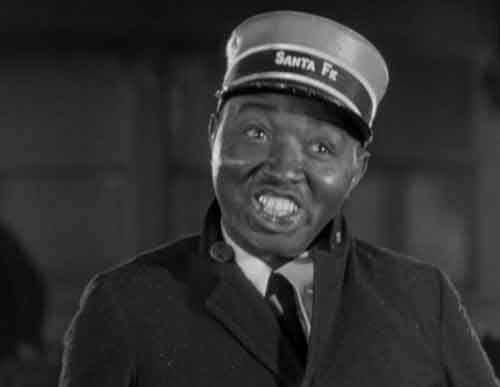- Messages
- 14,392
- Location
- Small Town Ohio, USA
James Lileks mentioned this Monday, and it got me thinking.
There weren't many good roles for black actors in all of the Golden Era. Take Sam McDaniel (brother of Hattie). He worked in films from 1929 until near the end of his life, in 1960. It's a remarkable long list of film credits. But the roles never changed: doorman, porter, waiter, servant, janitor, bartender, coachman, butler, handyman.

Of course, there were plenty of white actors who played the uncredited background roles also. Look at Walter Long - always the mug, the bookie, one or two lines. But as a block, black actors could expect to play few good roles at the forefront of a picture. A few come to mind: Hattie McDaniel got some plum roles. Louise Beavers in Imitation of Life. Bill Robinson. But those plum roles were as servants, or maids, or butlers, or cooks. The exception were musicians or professional musical performers like Cab Calloway, Louis Armstrong, the Nicholas Brothers - they played musicians or made appearances as dancers.
So just as there were record labels that produced records for a mostly black audience ("Race Records"), there was a separate, segregated Hollywood that made films with all-black casts that were meant for audiences of people of color.
Did the actors in those films achieve the same kind of stardom among black audiences? Did any of them ever make the change to bigger budget films with white actors? Did they even want to? They were earning a living as movie stars, after all, and reaching a white audience may not have been a priority. It would be foolish to assume that any sense of personal success in the film business could only be achieved by appearing in made-for-white films.
Can anyone think of other African-American actors from the Golden Era who avoided the Pullman Porter typecasting?
One wonders how many very talented performers never got their shot. How many Morgan Freemans (best actor living, in my opinion) started out as a "Smokey, the bookie's helper" and never got an inch farther?
It makes the breakout of Harry Belafonte and Sidney Poitier and others who came along in the 1950's all the more remarkable. Also, a study of the whole industry does seem to show that the movie business was indeed a reflection of popular culture and attitudes.
There weren't many good roles for black actors in all of the Golden Era. Take Sam McDaniel (brother of Hattie). He worked in films from 1929 until near the end of his life, in 1960. It's a remarkable long list of film credits. But the roles never changed: doorman, porter, waiter, servant, janitor, bartender, coachman, butler, handyman.

Of course, there were plenty of white actors who played the uncredited background roles also. Look at Walter Long - always the mug, the bookie, one or two lines. But as a block, black actors could expect to play few good roles at the forefront of a picture. A few come to mind: Hattie McDaniel got some plum roles. Louise Beavers in Imitation of Life. Bill Robinson. But those plum roles were as servants, or maids, or butlers, or cooks. The exception were musicians or professional musical performers like Cab Calloway, Louis Armstrong, the Nicholas Brothers - they played musicians or made appearances as dancers.
So just as there were record labels that produced records for a mostly black audience ("Race Records"), there was a separate, segregated Hollywood that made films with all-black casts that were meant for audiences of people of color.
Did the actors in those films achieve the same kind of stardom among black audiences? Did any of them ever make the change to bigger budget films with white actors? Did they even want to? They were earning a living as movie stars, after all, and reaching a white audience may not have been a priority. It would be foolish to assume that any sense of personal success in the film business could only be achieved by appearing in made-for-white films.
Can anyone think of other African-American actors from the Golden Era who avoided the Pullman Porter typecasting?
One wonders how many very talented performers never got their shot. How many Morgan Freemans (best actor living, in my opinion) started out as a "Smokey, the bookie's helper" and never got an inch farther?
It makes the breakout of Harry Belafonte and Sidney Poitier and others who came along in the 1950's all the more remarkable. Also, a study of the whole industry does seem to show that the movie business was indeed a reflection of popular culture and attitudes.



